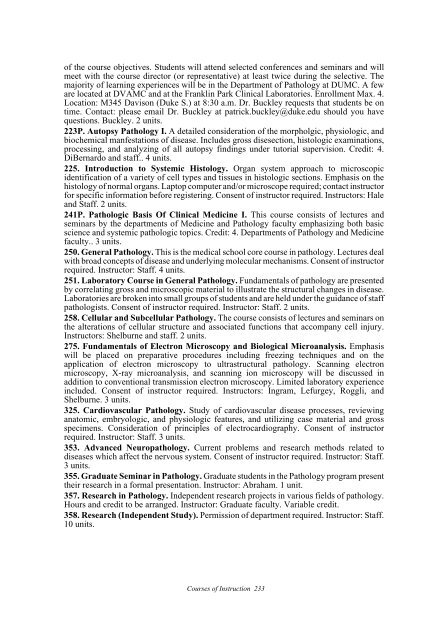Duke University 2008-2009 - Office of the Registrar - Duke University
Duke University 2008-2009 - Office of the Registrar - Duke University
Duke University 2008-2009 - Office of the Registrar - Duke University
Create successful ePaper yourself
Turn your PDF publications into a flip-book with our unique Google optimized e-Paper software.
<strong>of</strong> <strong>the</strong> course objectives. Students will attend selected conferences and seminars and will<br />
meet with <strong>the</strong> course director (or representative) at least twice during <strong>the</strong> selective. The<br />
majority <strong>of</strong> learning experiences will be in <strong>the</strong> Department <strong>of</strong> Pathology at DUMC. A few<br />
are located at DVAMC and at <strong>the</strong> Franklin Park Clinical Laboratories. Enrollment Max. 4.<br />
Location: M345 Davison (<strong>Duke</strong> S.) at 8:30 a.m. Dr. Buckley requests that students be on<br />
time. Contact: please email Dr. Buckley at patrick.buckley@duke.edu should you have<br />
questions. Buckley. 2 units.<br />
223P. Autopsy Pathology I. A detailed consideration <strong>of</strong> <strong>the</strong> morpholgic, physiologic, and<br />
biochemical manfestations <strong>of</strong> disease. Includes gross disesection, histologic examinations,<br />
processing, and analyzing <strong>of</strong> all autopsy findings under tutorial supervision. Credit: 4.<br />
DiBernardo and staff.. 4 units.<br />
225. Introduction to Systemic Histology. Organ system approach to microscopic<br />
identification <strong>of</strong> a variety <strong>of</strong> cell types and tissues in histologic sections. Emphasis on <strong>the</strong><br />
histology <strong>of</strong> normal organs. Laptop computer and/or microscope required; contact instructor<br />
for specific information before registering. Consent <strong>of</strong> instructor required. Instructors: Hale<br />
and Staff. 2 units.<br />
241P. Pathologic Basis Of Clinical Medicine I. This course consists <strong>of</strong> lectures and<br />
seminars by <strong>the</strong> departments <strong>of</strong> Medicine and Pathology faculty emphasizing both basic<br />
science and systemic pathologic topics. Credit: 4. Departments <strong>of</strong> Pathology and Medicine<br />
faculty.. 3 units.<br />
250. General Pathology. This is <strong>the</strong> medical school core course in pathology. Lectures deal<br />
with broad concepts <strong>of</strong> disease and underlying molecular mechanisms. Consent <strong>of</strong> instructor<br />
required. Instructor: Staff. 4 units.<br />
251. Laboratory Course in General Pathology. Fundamentals <strong>of</strong> pathology are presented<br />
by correlating gross and microscopic material to illustrate <strong>the</strong> structural changes in disease.<br />
Laboratories are broken into small groups <strong>of</strong> students and are held under <strong>the</strong> guidance <strong>of</strong> staff<br />
pathologists. Consent <strong>of</strong> instructor required. Instructor: Staff. 2 units.<br />
258. Cellular and Subcellular Pathology. The course consists <strong>of</strong> lectures and seminars on<br />
<strong>the</strong> alterations <strong>of</strong> cellular structure and associated functions that accompany cell injury.<br />
Instructors: Shelburne and staff. 2 units.<br />
275. Fundamentals <strong>of</strong> Electron Microscopy and Biological Microanalysis. Emphasis<br />
will be placed on preparative procedures including freezing techniques and on <strong>the</strong><br />
application <strong>of</strong> electron microscopy to ultrastructural pathology. Scanning electron<br />
microscopy, X-ray microanalysis, and scanning ion microscopy will be discussed in<br />
addition to conventional transmission electron microscopy. Limited laboratory experience<br />
included. Consent <strong>of</strong> instructor required. Instructors: Ingram, Lefurgey, Roggli, and<br />
Shelburne. 3 units.<br />
325. Cardiovascular Pathology. Study <strong>of</strong> cardiovascular disease processes, reviewing<br />
anatomic, embryologic, and physiologic features, and utilizing case material and gross<br />
specimens. Consideration <strong>of</strong> principles <strong>of</strong> electrocardiography. Consent <strong>of</strong> instructor<br />
required. Instructor: Staff. 3 units.<br />
353. Advanced Neuropathology. Current problems and research methods related to<br />
diseases which affect <strong>the</strong> nervous system. Consent <strong>of</strong> instructor required. Instructor: Staff.<br />
3 units.<br />
355. Graduate Seminar in Pathology. Graduate students in <strong>the</strong> Pathology program present<br />
<strong>the</strong>ir research in a formal presentation. Instructor: Abraham. 1 unit.<br />
357. Research in Pathology. Independent research projects in various fields <strong>of</strong> pathology.<br />
Hours and credit to be arranged. Instructor: Graduate faculty. Variable credit.<br />
358. Research (Independent Study). Permission <strong>of</strong> department required. Instructor: Staff.<br />
10 units.<br />
Courses <strong>of</strong> Instruction 233









